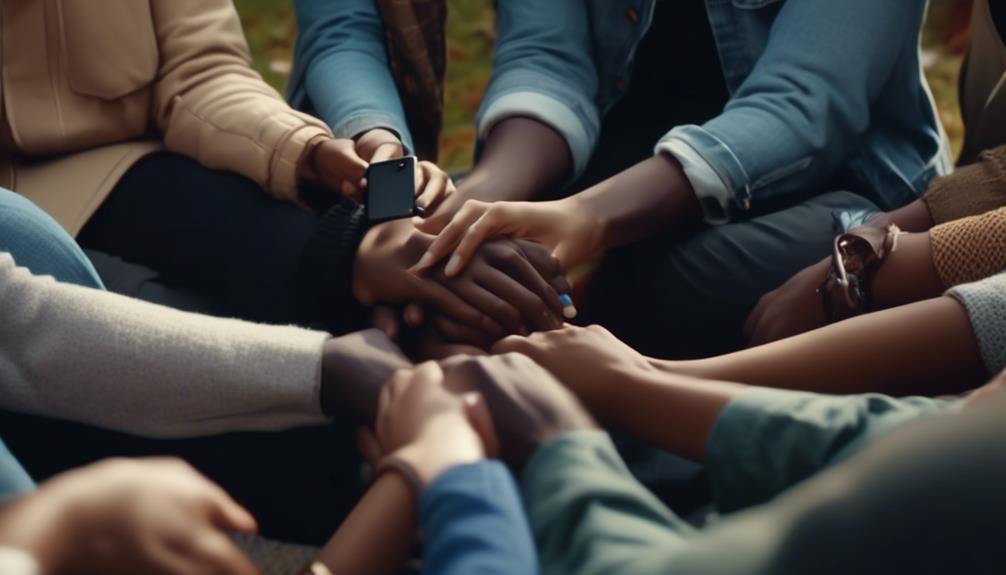There are twelve support groups tailored to help romance scam victims navigate the aftermath. These groups offer resources and strategies to help survivors cope. Each group brings a unique approach to addressing the needs of those affected. The variety of options ensures victims can find a community that resonates with their circumstances. These support groups play a crucial role in empowering individuals to heal and rebuild. Understanding available resources is invaluable for anyone seeking support in their recovery journey.
Scam Survivor Peer Support Group

The Scam Survivor Peer Support Group is a 10-week virtual program led by licensed counselors. It aims to help survivors of romance scams work through emotional aftermath and understand cybercrime. This free program provides a safe space for sharing experiences, receiving support, and learning coping mechanisms. The focus is to assist individuals in dealing with complex emotions arising from being a scam victim. It also aims to educate on cybercrime, including identity theft, online romance, and imposter scams. By offering mental support and guidance, the group empowers individuals to navigate the aftermath of romance scams. It equips them with knowledge to protect themselves from falling victim to similar schemes. The program is an essential component of the Cybercrime Support Network, providing survivors with comprehensive assistance and resources for recovery.
Advocacy Against Romance Scams
AARS aims to raise global awareness of online romance scams and advocate for platform responsibility through supporting H.R. 6125. It provides crucial support and resources for romance scam victims. The organization offers a Peer Support Program, a 10-week virtual program led by licensed counselors, focusing on mental well-being and cybercrime education for survivors. It also provides an After the Scam Guide and victim support resources. AARS expresses gratitude to its supporters and conducts webinars to raise awareness. By advocating for global awareness and education, AARS actively works towards combating online romance scams.
Fighting Fraud Webinar Series

The Fighting Fraud Webinar Series delivers valuable information and education on cybercrime and fraud prevention. Led by licensed counselors, the 10-week virtual program focuses on supporting the mental well-being of survivors of romance scams. It helps them work through feelings of loss, embarrassment, and isolation. Additionally, the program offers guidance for dealing with the aftermath of being a victim of romance scams. It aims to decrease rates of revictimization. Participants can access the program remotely via telephone or video conference.
This reduces barriers to participation and connects individuals beyond their immediate community. Furthermore, the program is free of cost to participants. This ensures that anyone in need can benefit from the valuable support it provides. The Fighting Fraud Webinar Series provides a safe space for individuals to share their experiences and connect with others who have gone through similar challenges. This fosters a sense of belonging and understanding. The program’s focus on mental well-being and guidance for dealing with the aftermath of cybercrime supports the participants in their journey towards recovery and empowerment.
H.R. 6125 Education Initiative
The H.R. 6125 Education Initiative focuses on increasing platform responsibility for online romance scams. It provides essential information for identifying, preventing, and supporting victims. The initiative aims to address the growing concern over the prevalence of online romance scams. It emphasizes the need for platforms to take responsibility in combating them. The initiative encourages individuals to sign a petition advocating for safer platforms without requiring a donation. It aims to foster a sense of community and collective action among romance scam victims.
The initiative offers a comprehensive PDF document with detailed information on the importance of platform responsibility. It empowers individuals with knowledge and resources to protect themselves and others. By educating the public on the signs of romance scams, it promotes a united front in holding platforms accountable. The H.R. 6125 Education Initiative seeks to create a supportive environment for romance scam victims. It also works towards preventing future occurrences. This educational initiative is a crucial step towards forming a community that actively engages in the fight against romance scams.
Romance Fraud Prevention Webinar

The Romance Fraud Prevention Webinar imparts vital insights and strategies to avoid romance scams. It provides expert advice and guidance from professionals in cybercrime and counseling. This equips individuals to recognize, avoid, and recover from romance fraud. The webinar discusses prevention strategies and the emotional impact of these scams, empowering attendees to protect themselves and others from fraudulent schemes.
Webinar Benefits
Led by licensed counselors, the 10-week virtual program provides a safe space for individuals affected by romance scams. It offers guidance for mental well-being and cybercrime education, supporting survivors. Participants can connect with other victims through a private Facebook group, sharing resources and experiences. The program aims to decrease revictimization rates and remove barriers, connecting survivors beyond their local community. Moreover, it provides exclusive educational materials on fraud, scams, and cyber safety, fostering empowerment in the online space.
Expert Advice Available
In light of the increasing prevalence of romance scams, the Fighting Fraud and Fueling Education Webinar provides crucial expert advice. Led by field experts, it offers valuable insights into recognizing and avoiding romance scams, serving as a vital tool against isolation. By accessing the webinar link, individuals can gain essential knowledge on protecting themselves and their loved ones. This expert advice empowers individuals to navigate the complexities of romance fraud and offers a sense of community and support. Don’t miss this opportunity to equip yourself with the necessary tools.
Prevention Strategies Discussed
In the Romance Fraud Prevention Webinar, participants will learn to recognize signs of abuse and manipulation. This will empower them to protect themselves from potential scams by understanding online romance scams and the harm victims may experience. Additionally, they will gain knowledge about cybercrime awareness and education to prevent falling victim to romance scams. Moreover, they will receive information on rights and responsibilities, helping them understand their legal rights in abusive situations. Lastly, they will be equipped with strategies for identifying and preventing identity theft, including creating an Identity Theft Report.
AARS Newsletter Subscription

AARS offers a newsletter for romance scam victims, providing coping mechanisms, mental health support, and resources. Subscribers access updates on the 10-week Peer Support Program led by counselors, the ‘After the Scam Guide,’ and AARS’ advocacy efforts. They receive regular updates on webinars, downloadable information, and opportunities to engage with AARS through social media. The newsletter connects individuals who have experienced similar challenges, fostering a sense of belonging and providing ongoing support.
Blogging for Awareness
Blogging for awareness is crucial for romance scam victims and advocates to share experiences and knowledge. Through blogs, individuals can connect, dispel misconceptions, and provide support, raising public awareness and breaking stigma.
Support Group Benefits
The Peer Support Program offers comprehensive help for romance scam survivors, providing structured support and guidance. Led by licensed counselors, it’s a free 10-week virtual program that offers mental well-being guidance and cybercrime education. Participants also gain exclusive access to a private Facebook group that connects survivors and provides educational resources on fraud, scams, and cyber safety. Additionally, there are extra resources available at ScamSpotter.org, covering topics such as identifying abuse, rights and responsibilities, types of abuse, and identity theft. This program not only provides support but also equips survivors with the knowledge and skills necessary to protect themselves from falling victim to romance scams in the future.
Finding Local Groups
When seeking local cybercrime support groups, start by checking community centers, churches, or counseling centers. These places often host various support groups and may have resources for romance scam survivors. Additionally, online platforms like Meetup.com or social media groups can help find tailored support groups. The Peer Support Program for Romance Scam Survivors offers virtual peer group sessions, providing a sense of local connection even in a virtual setting. By utilizing these resources, individuals can find local support groups that offer understanding, connection, and valuable guidance for navigating life after a romance scam.
Transparent NPO Partnerships

Collaborating with non-profit organizations is crucial for the Peer Support Program’s transparency and success. These partnerships ensure funding, support, and confidentiality. They also expand resources, expertise, and support networks, benefiting the program’s effectiveness and reach. Additionally, transparent NPO partnerships foster trust, accountability, and sustainability, ultimately contributing to the program’s success. Cybercrime Support is dedicated to fostering transparent partnerships with non-profits to ensure the program’s accessibility and success. These partnerships empower romance scam survivors and strengthen the program’s ability to assist and uplift them.
Victim Support Program Details
By collaborating with non-profits, Cybercrime Support’s Victim Support Program offers a 10-week virtual program. Led by licensed counselors, the program helps romance scam victims navigate complex emotions. It provides free and confidential support, including individual counseling and peer group sessions. Additionally, participants gain access to a private Facebook group for community support. This holistic approach aims to provide comprehensive support for romance scam victims.
Staying Safe From Romance Fraud

To stay safe from romance fraud, survivors can learn to identify red flags and seek advice from trusted sources. They should educate themselves about common scam tactics and maintain a healthy level of skepticism. By staying informed and seeking support, individuals can navigate the digital dating landscape with confidence and security.
Identifying Red Flags
To protect themselves from romance scams, individuals should recognize red flags, such as inconsistent stories and early financial requests. Additionally, being cautious of refusal to meet in person or express strong emotions quickly is important.
Seeking Trusted Advice
In order to stay safe from romance fraud, it’s important to seek trusted advice. The Peer Support Program provides survivors with free, confidential guidance. Led by licensed counselors, the 10-week virtual program focuses on working through loss, embarrassment, and isolation. Additionally, it offers education on cybercrime and mental well-being. The program aims to decrease revictimization rates and connect individuals beyond their immediate community. Participants can access exclusive resources, including a private Facebook group for sharing and learning about online safety. Engaging with the program helps individuals gain valuable insights and strategies to protect themselves from falling victim to romance fraud. This program plays a crucial role in the fight against cybercrime.
AARS Program Impact
The AARS Program Impact is a 10-week virtual program providing mental well-being guidance and cybercrime education for romance scam survivors. Led by licensed counselors in weekly one-hour sessions, the program focuses on reducing revictimization rates and helping survivors cope with loss, embarrassment, and isolation following a romance scam. The impact is substantial, with a professional guidance offering tailored support to survivors’ unique needs and fostering a sense of community and understanding. Participants gain access to educational resources aimed at raising awareness about cybercrime and preventing future victimization. An exclusive private Facebook group provides a safe space for sharing experiences and seeking support from peers. Overall, the AARS Program Impact is a vital resource for romance scam victims, offering comprehensive emotional and educational support in the aftermath of cybercrime.
AARS Visibility and Trust Building

The AARS Visibility and Trust Building program creates a supportive environment for romance scam survivors. It guides them through the emotional impact of cybercrime. The program prioritizes trust and visibility to reduce barriers to participation and increase victims’ trust. By offering a safe space, it helps survivors work through feelings of loss, embarrassment, and isolation. Additionally, the program educates participants about cybercrime complexities, empowering them to prevent future victimization.
Frequently Asked Questions
What to Do if You Are a Victim of a Romance Scam?
If you’ve fallen victim to a romance scam, seek help from local law enforcement and report the scam. Consider consulting with a legal professional for guidance.
How Do You Deal With Trauma of Being Scammed?
Coping with the trauma of being scammed involves seeking help from counselors and joining support groups. Recovery needs a safe space and guidance for sharing experiences.
What Should I Do if I Am a Victim of a Scam?
If you are a scam victim, immediately contact the authorities to report the incident and seek legal recourse. This is essential for holding scammers accountable.
How Do You Recover Emotionally From a Romance Scam?
Recovering emotionally from a romance scam is tough. It needs time, self-reflection, and support. Acknowledging the experience is the first step. Seeking professional help and connecting with others who have gone through similar situations are crucial for emotional healing.
Conclusion
In conclusion, these support groups for romance scam victims provide vital resources for individuals dealing with online deception. Moreover, a recent study found that 30% of romance scam victims suffer from symptoms of post-traumatic stress disorder (PTSD) due to their traumatic experience. Consequently, the availability of these support groups is crucial in addressing the mental health needs of those affected and facilitating healing and recovery.



